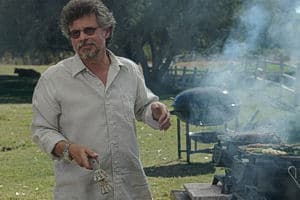Camp grilling with Steven Raichlen
After 6 years of contributing to Paddling.net as a food columnist I think it is about time I tell you more about someone I admire a lot and whom you have certainly heard of if you like your steak well seared: Steven Raichlen, the master of the grill and founder of the Barbecue University. This Florida-based writer and host of the popular PBS TV show "Primal Grill with Steven Raichlen"has written 28 books about different techniques to master barbecuing; among them, The Barbecue Bible, How to grill, Indoor barbecue and Planet Barbecue have totally changed my approach to outdoor cooking and made me one of millions of Raichlen's fans throughout the world. I must also say that my husband, who is the true barbecue expert in our family, is an absolute devotee, not only because he offers hundreds of mouth watering recipes, but because he is such a wonderful teacher. His advice is always crystal clear and the techniques he explains are easy to understand and to master.

An approach of barbecue based upon history and anthropology For my part, as a food writer and gastronomic journalist I've been fortunate enough to meet with Steven Raichlen several times and to discuss different approaches to grilling. I must say that this extremely kind, generous and knowledgeable man is the expert that I've always had the most pleasure exchanging ideas with. He is truly the master of the grill in all its facets: not only does he have the most extensive repertoire of grilling recipes, but I love the vast culinary curiosity and the deep culture that Steven Raichlen brings to the food scene. He would never call himself a chef but rather a journalist and a writer. His approach is based upon a passion for anthropology and history and all his books reflect thousands of hours of careful research, hundreds of trips around the planet and a true passion for other cultures and their evolution through food, which is so fascinating. He is a true citizen of the world and I suspect that his love for grilling is a means to try to erase frontiers and to bring human beings closer.
As he once said to me in flawless French (so I translate freely):
"I'm obsessed with grilling because it brings us to the roots of humanity and it is the most interesting way to get to know world cultures and the many influences that intermingled with one and another through the ages."
For Steven Raichlen, grilling was certainly the path that mankind traced towards modernity because by mastering fire man could also expand his frontiers and his own territory, he could survive in harsh winter conditions and become more creative about his survival. And, most importantly, along with mastering fire came the pleasure of cooking; actually, finding plants that would add aromas to that charred piece of venison, crushing some berries over a roasted hen or squeezing some citrus juice on a grilled wild boar, only to discover that the meat would become tastier and tender.
It is fascinating to watch this natural born teacher take you by the hand to guide you through Asian, African, Aboriginal, South American culinary customs, and peruse the centuries to explain his theories. Raichlen incorporates past history into 21st century cooking in North America, where we have recently learned to rub our fish and meat with flavorful spice mixtures that are a legacy of this trip through time: cumin seeds, ginger, cinnamon, clove, etc. They are all part of this chain of influences that have travelled the world and which are centuries old.
So let's grill!
This also brings us to our next camping trip, where we will be lucky enough to carry the smallest portable barbecue, grill or mini hibachi and, by this simple gesture, it will put us at par with our ancestors… That's why on this Memorial Day holiday, I took the liberty of calling Steven Raichlen. I caught him working of his first novel, a love story set on Martha's Vineyard that will be published in May 2012. He is also preparing his next cook book that is specially designed for men. Knowing how much he loves the great outdoors, I asked for his advice to help us enjoy the grill on a nice summer day even when on a kayak or canoe trip, which is certainly a wonderful way to enjoy the beauty of this too short season (well, for many among us who live in the northern hemisphere…).
What kind of barbecue to use?
If finding the right portable barbecue for canoeists is easy enough, it remains a challenge for sea kayakers because of limited cargo space; but a few options are suitable: a mini cast iron hibachi can be placed in front of your feet at the bottom of the kayak along with a bit of charcoal. The Notebook grill is an interesting option too. It is a 14 inch barbecue which folds flat just like a beach chair. Aluminum foil disposable barbecues that are available in chain stores work well too.
Fire pit works well when allowed
In regions where it is allowed, Steven suggests cooking your meal on a fire pit by simply carrying a foldable grill grid. Here is how he proceeds to prepare the embers: "If local laws allow it start with a "tepee" of small hardwood twigs and tinder built over a fire starter or fatwood. (Pine needles or small branches are also good fire starters, but once the fire gets going, feed it with hardwoods.) As the fire catches, continue to add larger pieces of wood. Let the flames burn down to glowing embers before you cook over it." Then it becomes very easy to grill meats or fish on green sticks over or in front of the fire. Steven suggests you cook meats and vegetables directly in the embers. "This is, in fact, one of my favorite ways to cook steaks that are 1-1/2 to 2 inches thick. Or simply cook that wonderful trout on a log in the fire as described on page 471 in Planet Barbecue."
Essentials to carry
For a 5-day paddling trip, here are the essential tools that Steven Raichlen would bring on board as a grilling aficionado (apart from the regular camp kitchen items):
- Matches in a waterproof pouch (maybe a butane lighter for back-up)
- Fatwood or paraffin fire starter cubes
- Locking tongs
- A spatula
- A decent knife
- A roll of extra-strength aluminum foil (very handy in a camp kitchen)
- Grilling gloves
- Bristled pastry brush
- Assortment of zip-top type plastic bags (including large ones*)
- Butcher's twine
- Kitchen towels
- Salt, pepper, favourite spices, rubbing salts
- Don't forget a headlamp to be able to grill efficiently at night!
- Small flexible cutting boards
Safety concerns
Since many multi-day paddling trips are done in total autonomy, Steven Raichlen stresses the importance of food safety for barbecuing in this particular context.
Here are a few points to bear in mind:
- Fresh meat will not last very long, of course. One or two days at the most and it needs to be surrounded by ice at all times, which is a challenge.
- So freeze meat before packing, and keep it cold (less than 40°F/4°C). That's the easiest way to get 2-3 days of meat supply. But make sure it's very well wrapped as you certainly don't want to contaminate ice you might be using to cool the rest of your food supply.
- Marinated meat must be eaten the first night of your trip; no exception!
- Sturdy fruits and vegetables are less perishable-onions, potatoes, apples, carrots, etc. They are delicious on the grill and can also be cooked in aluminum pouches with olive oil and spices.
- Use cured meats and/or dehydrated foods-preferably, ones you've prepared yourself-or canned foods (chicken and tuna now come in convenient, light-weight pouches) to supplement your diet.
- Hopefully, fresh fish and/or seafood such as clams or mussels will be plentiful for the latter part of the trip. Don't forget to get a license to be allowed to harvest them and make sure the area you are foraging for these delicacies is not contaminated!
How to cook fish on the grill
One of Steven Raichlen's favorite whole fish recipes is also one of the simplest: season the fish (cleaned, naturally) inside and out with salt and pepper. Put thin slices of lemon and onion in the cavity along with a few pats of butter (or olive oil, which is easier to carry). Arrange on a grill grate and grill until the fish flakes easily when pressed with a finger. Alternatively, you can impale the fish on a green stick (secure it to the stick with the butcher's twine you've cleverly brought; see above) and cook it over or near the fire, turning as needed.
Steven enjoys serving his fish with white potatoes or sweet potatoes roasted directly in the embers, complemented with a simple salad of sliced onions and cucumber with olive oil/lemon vinaigrette. For a cocktail before meal: an icy gin martini and for dessert, he is happy with Shortbread cookie s'mores.
Mussels and clams are extremely easy to cook on the grill grate: simply place them over the fire until they open. Put in a bowl and toss with your favourite dressing before serving.
Rubbing salt
Steven Raichlen always uses rubbing salt for his grilling. Here is an easy recipe from his best seller book How to grill that he and his publisher (Workman Publishing Company) have allowed me to use. We thank them for their generosity.
Recipes
Provence herbs rubbing salt (delicious with lamb, chicken and seafood)
- Ingredients
- 3 tbsp dry tarragon
- 3 tbsp dry oregano
- 3 tbsp dry dill
- 3 tbsp dry thyme
- 3 tbsp dry rosemary
- 3 tbsp coarse salt
- 2 tbsp lemon pepper* (see note)
- 3 tbsp dry garlic
* Note: lemon pepper is ground black pepper mixed with lemon zest. It is available in most supermarkets.
In a small bowl, mix all ingredients (using your hands rather than a whisk or a spoon). It will keep at least 6 months in an airtight container, away from heat and light
To get to know Steven Raichlen, work a little better, and to get dozens of grilling ideas for your next paddling trips, here are the links towards his website and his new TV show, "Primal grill with Steven Raichlen":
Related Articles
I've been busy lately rearranging my cooking essentials: the little tools that I can't do without. Of…
"All day I've faced a barren waste without the taste of water, cool water.Old Dan and I with throats…
Who says that cooking with herbs should be reserved only for home cooks and that campers shouldn't take…
Growing up in a big multiethnic city I often shared meals with the family of one of my best friends,…

